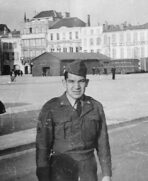(Editor’s Note: The Congressional Gold Medal ceremony has been cancelled as well as the Bataan Memorial Death March.)
Nearly 10 years after his death and 75 years after he survived the Bataan Death March, Silverio Max Garley will be recognized for his service and sacrifice to his nation.

Silverio Max Garley’s family will accept, on his behalf, the Filipino Veterans of World War II Congressional Gold Medal during a ceremony in Las Cruces this weekend.
Submitted photos
Garley, a Belen native, was a slave laborer in the coal mines at Fukuoka Camp No. 23 when the battle for Bataan ended in 1942. He was liberated in September 1945, but during his time as a POW, he spent 32 days on a “hell ship” packed into a hold with 1,800 men. After being held prisoner for 42 months, Garley served in the military for another 22 years, retiring as a staff sergeant. He died at 94 years of age on Sept. 17, 2010, in Tacoma, Wash.
His family will be accepting, on his behalf, the Filipino Veterans of World War II Congressional Gold Medal — the highest recognition bestowed by our grateful nation — at a ceremony on Saturday, March 14, at the Las Cruces Convention Center.
“Receiving this medal on behalf of my great uncle means a lot to me,” said Petunia Padilla, who lives in Kansas. “I think he’d be proud to see how there are people who are striving to not let Bataan be forgotten about.”
The bill for this Congressional Gold Medal was passed and signed by President Barack Obama in 2016, and the medal has been awarded since 2017. This medal is not limited to only Filipinos, but to any service member who served honorably at the time from July 26, 1941, to Dec. 31, 1946, in defending the Philippine Islands.

Silverio Max Garley after his release as a prisoner of war in Japan. He weighed 105 pounds. Before the war, he weighed 167 pounds. He was forced to work in a mine.
Submitted photo
“This medal presentation ceremony is quite significant because it is held the day before the Bataan Memorial Death March Marathon that’s held at White Sands Missile Range every year,” Padilla said. “I learned of this event a few years back, and it jogged my memory that I had a Bataan survivor in my family.”
Since then, Padilla has collected newspaper articles and what she can find on her great uncle in the National Archives and information from Bataan museums.
“The first year I attended the march, I was able to shake hands with the survivors and hear their stories. It inspired me to come back and honor the men that experienced hell,” Padilla said. “These men had to endure a horrific life for the next 3 1/2 years as prisoners of war by the Japanese.”
Padilla never met her great uncle but, along with other family members, have honored his memory and his legacy by participating in the Bataan march for years.
While Garley never spoke about his time as a POW, he did write about it — for the first time — for an article published in the News-Bulletin in 2005.
“The ship we were in had two holds, and both holds were half the size of a tennis court, in which 1,800 men were crowded in,” Garley wrote. “Many died of suffocation and they were just thrown overboard withot a prayer or nothing. I don’t know how I survived those 32 days.”
Of the 1,800 men in the regiment, less than 900 made it back home, and within a year, one-third of them died from various complications.
Garley was placed in a prison camp in Cabantuan before being transported to the port of Manila — a journey south of 100 miles by “hell ship.” He spent 18 months at Camp 17 in the coal mines. During his time as a POW, Garley relied on his skills — making baskets and cooking — to stay alive.
“The Bataan Death March had a huge impact on New Mexico families,” Padilla said. “Of the 1,816 200th and 515th Coast Artillery of the New Mexico National Guard men identified, 829 were to never return home.”
Padilla hopes another bill will soon be passed.
“I’d like to also share a new House resolution introduced in November — HR 5044-116th, to get a Congressional Gold Medal for the POWs of Bataan.
“Please contact your congressmen to get this bill passed,” she said. “We must never forget these great men and give them the utmost honor they deserve.”
Clara Garcia is the editor and publisher of the Valencia County News-Bulletin.
She is a native of the city of Belen, beginning her journalism career at the News-Bulletin in 1998 as the crime and courts reporter. During her time at the paper, Clara has won numerous awards for her writing, photography and typography and design both from the National Newspaper Association and the New Mexico Press Association.

















